Cruises are a unique kind of vacation. They are similar to all-inclusive escapes, minus the whole being-on-land aspect. As such, cruises sometimes bring out different behaviors in travelers. Some behaviors are great, while others leave fellow guests and cruise workers scratching their heads. Typically, courteous conduct is not frowned upon, but in the case of cruise ship workers, these seemingly polite behaviors can cause more headaches and more work. To avoid being the guest that everyone attempts to avoid, we’ve gathered information from expert sources to narrow down which behaviors mean well but can become a burden to your cruise crew.
Most travelers go out of their way to treat staff and workers with respect. However, what one person sees as friendly or courteous, another might see as cumbersome to their overall experience with you. If you want to truly help cruise employees out, avoid these well-meaning behaviors at all costs.
Telling everyone about a special meal request

Travelers with unique dietary needs often feel like a burden to others in their party and, sometimes, the servers in the restaurants. Nothing is more satisfying than being able to request a special meal and having that request fulfilled. However, unless your tablemates also have the same restrictions or needs, telling everyone how delicious your requested meal is isn’t particularly polite. Unlike other restaurants, cruise ships have limited time and resources available to feed everyone on board. Special requests are usually made in advance or take a while to prepare, and if other cruisers can’t get the same item you requested as soon as they ask for it, they may be disappointed.
Additionally, the kitchen may not be equipped to handle hundreds of special requests. It may feel like you’re being generous by complimenting the chef to everyone you meet, but it would be better for everyone to handle those kinds of compliments privately.
Reusing plates or cups at the buffet

Helpful cruisers are, sadly, a rare breed of traveler. While some act like it is beneath them to pick up trash or clean up a mess, other guests may take their helpfulness to an extreme. Even the biggest vessels are very close environments, and it is very easy to spread germs on a cruise vacation, which is why cruise ships offer hand sanitizing wipes at every turn and encourage hand washing before entering the buffet line or restaurant. Guests who know how much work it takes to keep a ship clean and running may believe reusing a plate or bringing their personal cup to a beverage refilling station is helping the crew out.
Reduce, reuse, and recycle is a great mantra for those of us on land, but it doesn’t translate well to vacations on the oceans. Reusing plates, utensils, or cups that have already touched a passenger’s mouth or hands can rapidly spread germs. In a tight environment like a cruise ship, the more polite behavior would be to reach for a clean plate or cup each time you want a refill.
Giving the crew a compliment at guest services
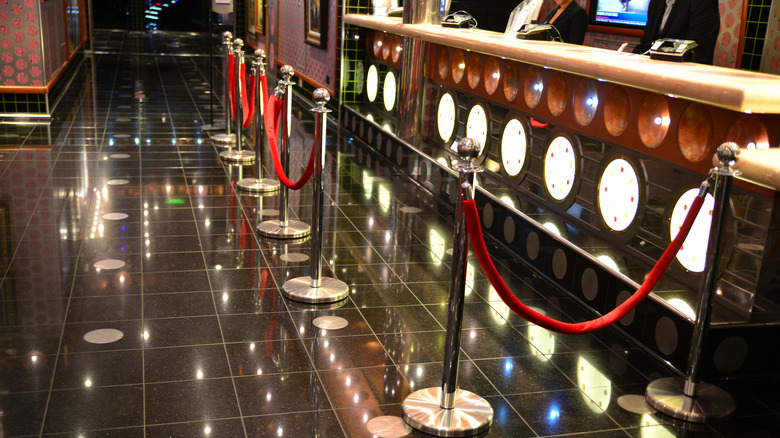
Ihor Koptilin/Shutterstock
Who doesn’t love to hear something nice about themselves? Everyone loves a compliment, including your cruise crew. However, it is important to make sure that the compliment goes to the correct person. Guest services workers can assist cruisers with many things, but they are not in charge of other crew members. Likewise, while probably one of the most visible crew members on the ship, the cruise director is also not in charge of the other crew. The cruise director and guest services crew cannot do anything with those compliments. While the intention was good, sharing how incredible another crew member was with their fellow crew member does not help anyone in the long run.
The right way to compliment the excellent folks onboard is to fill out the survey at the end of the cruise and recognize workers by name on the form. Writing down their names on the survey allows their supervisors to reward the crew members accordingly. Those in charge won’t know to praise the particular crew member if you don’t tell them and name the lucky party!
Buying an entertainer a drink

Anthony Devlin/Getty Images
Adults who like to imbibe would never turn down a free drink, right? In most cases, turning down a free drink from the bar is seen as rude. However, on a cruise ship, guests offering to buy entertainers or other crew members an adult beverage may actually be putting them in a difficult position. As with many jobs, crew members are typically not allowed to consume alcohol while “on the clock.” There are exceptions on occasion, but the cruise line worker will probably have to turn down the drink offer to keep their job. It will most likely make them (and you) feel awkward as they want to grant as many guest requests as possible, but this request just isn’t wise.
In addition, when cruise employees are “off the clock,” they have their own bar and dining establishment for enjoying and winding down. Not only that, the dining and drinks in the crew area are typically offered at a highly discounted rate. Instead of purchasing an overpriced drink, show your appreciation with a tip or added gratuity.
Sharing your drink package with others

Tint Media/Shutterstock
Buying a drink for a friend or fellow cruise guest is not against the rules. However, sharing the benefits of your drink package is completely against the terms of most cruise liner codes of conduct. Guests have tried many times over the years to skirt this rule or claim that buying a drink is all in the name of friendliness, but cruise lines have become savvy to many of these “tips” for saving money on a cruise.
It may seem polite to buy someone else a drink, and it can be. However, guests need to ensure that they are not becoming too overeager about purchasing drinks, especially if they decided to add a drink package attached to their stateroom. Cruise lines can revoke package privileges, and bartenders or wait staff can be put into uncomfortable situations if there is suspicion that a guest is sharing their drink package with other cruisers.
Not complaining right away
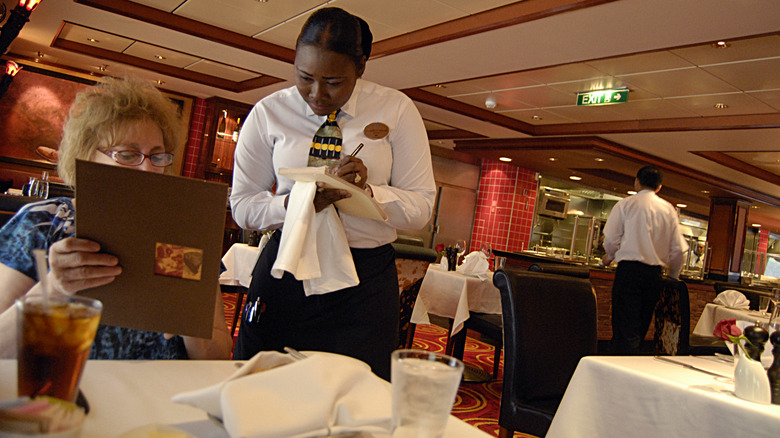
Francis Dean/Getty Images
Complaining as a polite behavior? Believe it or not, cruise workers want you to talk to them about any problems or issues that arise. Complaining doesn’t have to be fraught with ill words or anger. Instead, think of your request or issue as an opportunity for the crew member or members to show you how they’ll go above and beyond for you. Too many cruisers wait until it is time to fill out that all-important end-of-cruise survey to hash out their issues.
While you may feel like you are being polite by always being agreeable, crew members would rather know right away when something is amiss. Bringing up an issue or complaint before you disembark allows crew members the opportunity to make it right. They cannot make it right if they don’t know about it. Gary Bembridge, cruise expert at Tips for Travellers, shared, “Negative reviews and ratings make their life more difficult and could affect promotions or future contracts.”
Asking personal questions or flirting with crew

Alina555/Getty Images
How friendly is “too friendly?” Navigating polite conversation in everyday social circles can be challenging, especially with new faces, and that is no different on a cruise vacation. Crew members want to get to know you, even if they will only be with you for a short time. However, getting to know someone does not have to include overly personal questions. Finding common ground on which to relate to your stateroom host or server can make conversations more enjoyable for all parties. Keep questions and comments away from divisive topics like religion, politics, or other topics that can veer off into awkward territory quickly.
Additionally, flirting with crew members can be just as awkward as asking questions that are way too personal. Not everyone in the crew is single or looking for a relationship, and even if they are, engaging in flirtatious behavior with cruise guests can impact the crew member’s job.
Helping the crew do their job
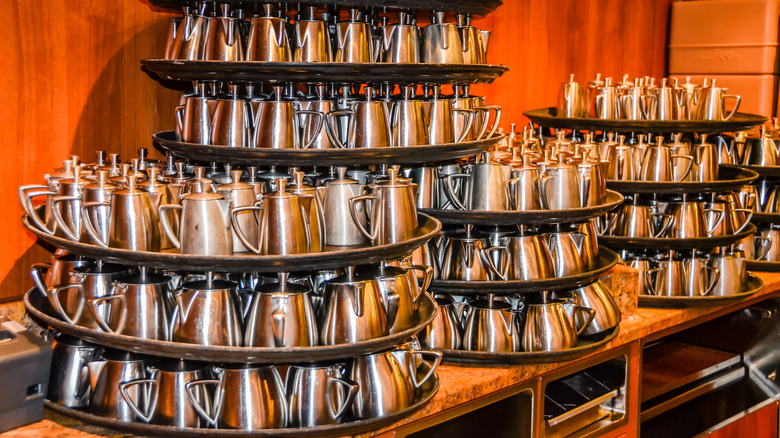
Sandra Foyt/Shutterstock
Attempting to help the crew do their job is not only impolite but can also be dangerous to you or other passengers. Stacking plates, cups, or utensils for the crew member seems helpful. In reality, the crew member will probably have to take more time to unstack your pile to carry the dishes in the safest manner, as learned during their training. When guests interfere with the processes of the staff, it can create more work or get the staff member in trouble with a supervisor.
“In the main dining rooms where crew have to carry and clear many plates and dishes, there are methods and processes for clearing tables at dinner to pick up and stack the plates in a specific way, clear plates of leftover food to go into the kitchens or into food recycling,” Bembridge said on Tips for Travellers. “I now realize the polite and right thing to do is be aware of the processes crew have to use and let them get on with it!”
Going to your stateroom early
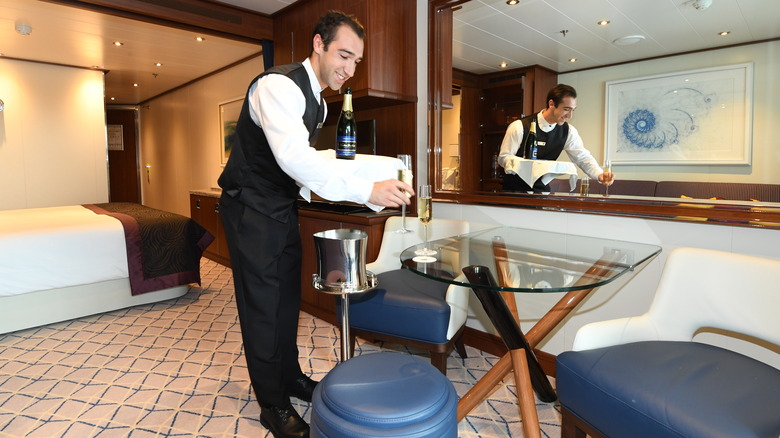
James D. Morgan/Getty Images
Embarkation day is a flurry of activity. From checking in at the port to exploring the ship to squeezing in a dip in the pool, there are plenty of things to do when boarding a cruise ship. However, it may seem like you are in the way if you find yourself just hanging out in the ship’s atrium or various seating areas, and you might be tempted to make an early dart for your cabin. Rest assured, crew members would rather you stay out of your staterooms. Cruise ships have to turn over staterooms very quickly between each sailing, and stateroom hosts cannot do their jobs if the previous cruisers are not out of their rooms or the current passengers try to get into their rooms too early.
No one, especially cruise workers who oversee the staterooms, believes passengers who spend the first few hours on the ship anywhere but their rooms are “in the way.” Cruise lines want passengers to take those first few hours to explore the ship, sign up for spa treatments, or take advantage of the buffet. This early exploration of the ship helps passengers get their vacations started while giving crew members time to get everyone’s staterooms in order.
Tipping on the bar tab or restaurant check

Sdi Productions/Getty Images
One of the best ways to express satisfaction on a cruise is through tipping or additional gratuity. While all tips and gratuities are appreciated, some cruise lines compile all restaurant and bar tips together before splitting the tips equally among the crew. When guests tip crew members with cash, they can be assured the tip stays with the employee whose service they want to commend.
A cruise line employee told Reader’s Digest, “Passengers may think they are generously tipping a crew member by writing in a tip on the receipt, but it sadly doesn’t go to that crew member. My understanding is that it goes into the ship’s account, and that’s how the ship pays for the ‘gratuities paid for’ incentives you see when you book your trip. It’s kind of distributed between all the crew … and maybe not even that.” When in doubt, tip with cash.
Commenting on a performer’s appearance
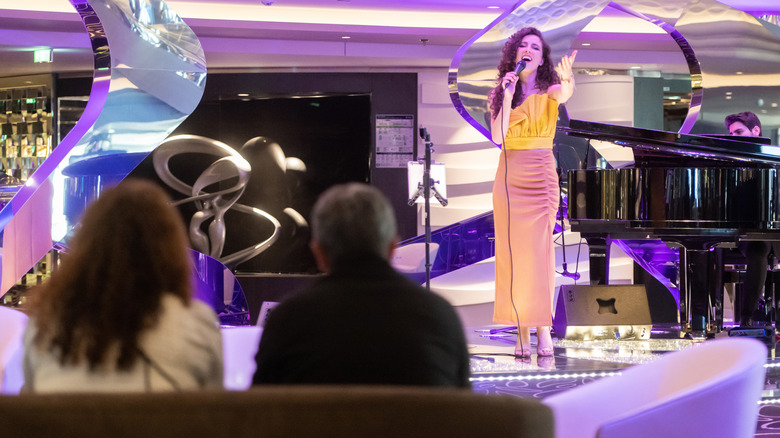
Anthony Devlin/Getty Images
Cruise trips are some traveler’s preferred form of vacation, and when they find their favorite ship, itinerary, or cruise line, they can become repeat customers. As a repeat customer, some passengers may feel familiar with crew members or the ship’s entertainers. While it can be great to see familiar faces and exchange pleasantries, commenting on a performer’s appearance can come across as truly impolite behavior.
Though guests may feel as though they know the performer, the reality is that the performer is still an employee providing a service to the guest. If a guest makes an inappropriate comment about the performer’s appearance, the conversation can turn embarrassing in a heartbeat. The comment could come across as an unwanted advance that might make the performer uncomfortable. Alternatively, a comment may come across as judgmental and rude, especially when it pertains to a performer’s size, weight, or other personal issues.
Talking to the piano player while they are playing
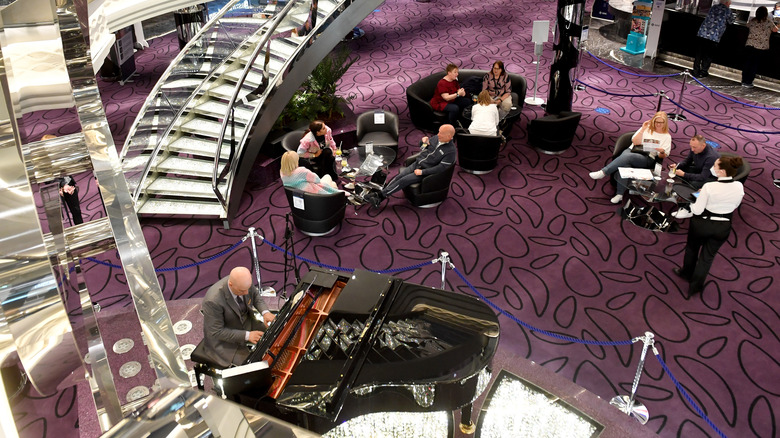
Anthony Devlin/Getty Images
Many cruise ships have piano players, most of whom tinker away in the main atrium. Piano players provide enjoyable background music and can put on incredibly entertaining performances. Like any performer, piano players appreciate compliments on their playing. Offering a compliment while they are in the middle of a song or show is not as polite as you may think it is. Save your compliments for the end of the performance.
“Guests will come to talk to you in the middle of a song to tell you how much they are enjoying your music, but then it’s sometimes difficult to remember where you were, and you can lose the song,” Steve M., a cruise director for over 15 years told Reader’s Digest. “While it’s nice that people appreciate your talent, there are other ways of showing it.” We all know how frustrating it is to be interrupted in the middle of a challenging task.
Leaving cups, plates, or trash in hallways
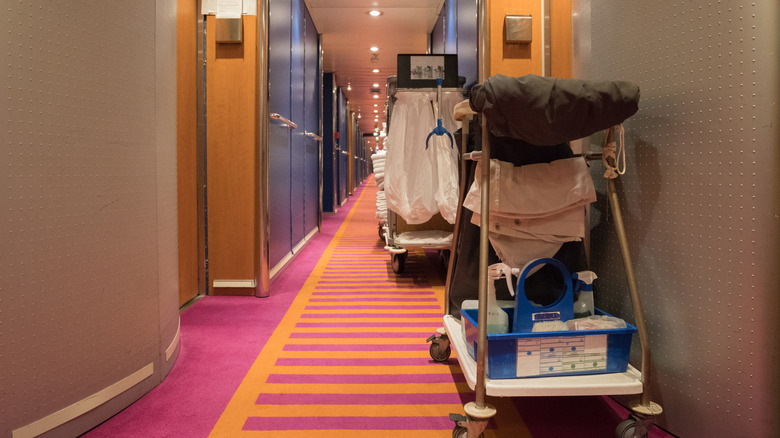
Mgstudyo/Getty Images
Parents everywhere would love for their children to clean their rooms without being told. However, cleaning your own room while on a cruise is not something cruise workers truly want you to do. Staterooms, even ones with balconies that hold up to five adults, are crowded places on most cruise ships. It probably feels like you’re doing the right thing if you take out your trash or put your used cups, dishes, and utensils in the hallway.
As much as this behavior may seem polite, it makes more work for your stateroom host in the long run. Aida Carvahlo, a former human-resources manager for MSC Cruises, Viking Cruises, and Holland America Line, told Business Insider, “After eating, they leave plates and glasses through the hallways of cabins.” This can become a tripping hazard for other crew members and guests, turning a seemingly polite behavior into a bigger problem for everyone on board.
Attempting to help with the boat tender or other excursion travel
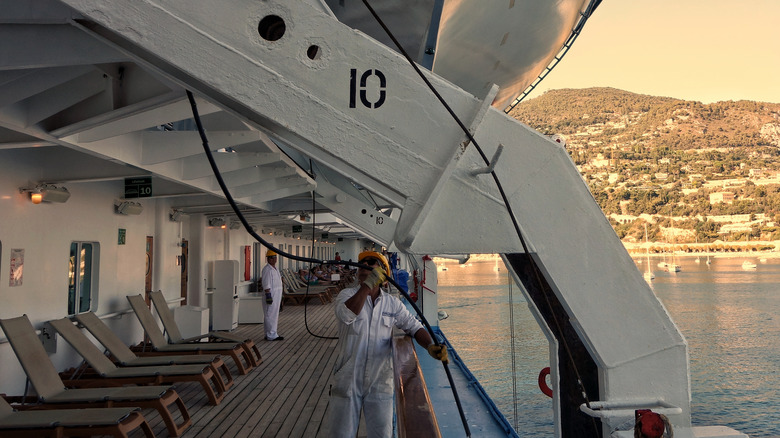
Quirky Badger/Shutterstock
You may be the expert sailor or vehicle packer in your group, but when you’re on vacation, it is okay to pass that job on to other people. On a cruise, specifically, allow crew members to do their jobs of tendering excursion boats or loading a bus for departure from a port of call. Attempting to help with a boat tender can be dangerous for guests and crew members, even if it seems helpful at first. The crew is looking out for the safety of all passengers, and that can be a challenge if they have to watch out for rouge guests who think they’re being helpful. You are on holiday, after all.
If you are on a cruise excursion that involves equipment, it is okay to let the crew members or excursion guides manage that. Not only are they trained to handle the equipment, but if they injure themselves while performing their job, they can take that up with their employer. If a guest gets injured on an excursion, not only will there be unnecessary medical bills to pay, but the crew member or excursion guide could lose their job.
Methodology
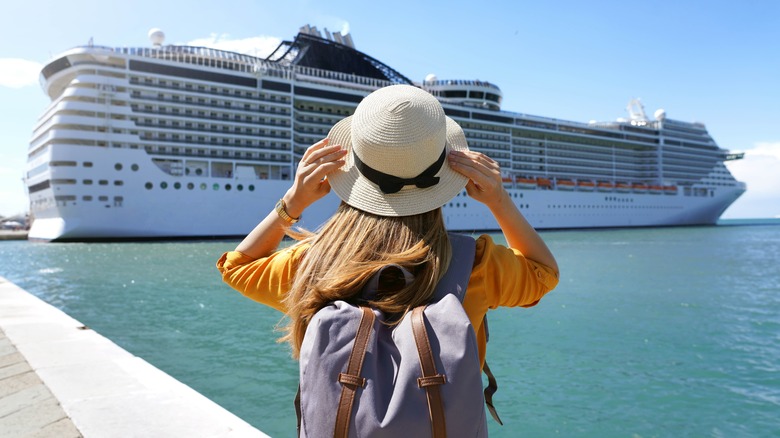
Zigres/Shutterstock
We used multiple sources to compile our information for this article. Quotes from respected sites such as Reader’s Digest and Business Insider were coupled with articles from expert cruises who shared their personal experiences onboard multiple cruise line vacations.

